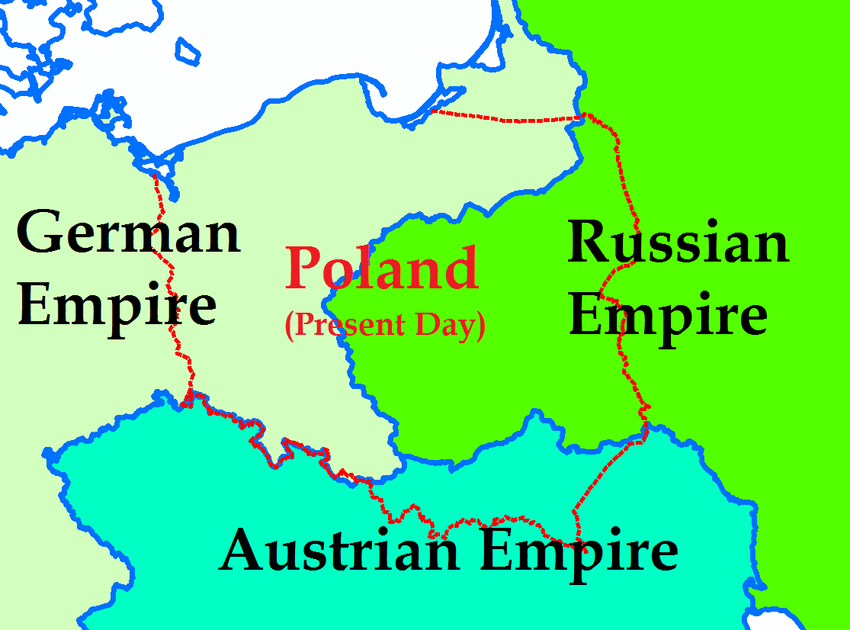
🧵Thread on Poland's geoeconomic outlook as the we shift from a #unipolar world to #multipolarity. Poland's position has always been extremely precarious, as it sits at the wide open end of the North European Plain, flat land between the Carpathians and the Baltic, with...[1/n] 

...few natural barriers from the West or East (it is not protected by Alpine mountains or sea). But it's even worse than that for Poland, as it's sandwiched between the two 800lb gorillas of European power, Russia and Germany. And indeed, this has seen Poland blotted from...[2/n] 

...the map entirely (from 1772, with the first Partition of Poland, until the establishment of the Second Republic in 1918; and then again after 1945, when its borders were shifted westward and and the country was reconstituted as little more than...[3/n]
en.wikipedia.org/wiki/Partition…
en.wikipedia.org/wiki/Partition…
...a Soviet satellite state, designed as a gumshield for Moscow). All of which is to say, this is an area of the world where geopolitics have real, immediate and visceral effects on peoples and nations in a way that is difficult to understand for Britons and Americans. It...[4/n]
...is also a region, though, where vast empires can emerge as quickly as they vanish. Before the late 18th Century partitions, Poland had been the centre of a sprawling empire from Poznan in the West almost to Moscow in the East, and from the Baltic in the North, well...[5/n] 

...into the currently infamous Kherson and Zaporozhye regions of Ukraine, all of Belarus and most of the modern Baltic nations. After the collapse of the Soviet Empire -- a process in which the Poles played a leading role -- Poland sought to secure its independence by...[6/n] 

...joining NATO, in 1999. It further sought to cement its exit from the Russian sphere of influence by joining the crypto German sphere of influence in 2004. Note, that in addition to bringing it inside the US defence perimeter (and nuclear umbrella), NATO accession meant...[7/n] 



...help modernising its armed forces at a time when the FSU was falling behind. Likewise, EU accession meant that, in addition to integrating into the German economic supply chain, Poland secured significant inward investment and private and public aid for modernisation. [8/n]
The country thus negotiated the 1990s far more comfortably than Russia. Yet, geopolitical reality is reality, and Poland must always fear being subsumed by one of Russia and Germany, or both in a nightmare scenario in which the two form a loose alliance, as they...[9/n]
...have done in the past given their natural trade synergies. So, while Poland has used Germany and America as a shield against Russia, and remained implacably opposed to the latter, it has also not fully integrated with Germany in the way the Netherlands or...[10/n]
...Czechia and Balts have. It never adopted the euro, for example. It has also led the formation of the Visegrad Group -- of Poland, Czechia, Slovakia and Hungary -- intended to give these new EU nations a greater voice against Franco-German domination of the EU. Further...[11/n]
...as it has grown richer and more secure, it has become increasingly assertive of its sovereignty, reclaiming control of its judiciary, for example, thus protecting against a key means by which Germany, through Brussels, imposes its will on member states. Poland has... [12/n]
...also fought ferociously to prevent increased Russo-German economic cooperation (that old worst nightmare) through its opposition to the Nord Stream pipelines. Increasingly, it has directly opposed Germany: on the EU response to the 🇺🇦 crisis, and even going so far as...[13/n]
...to demand trillions of dollars of reparations for WWII. So where next? A simplified view of Poland's geopolitical imperatives would be as follows. (i) Secure an outside power capable of doing what Poland isn't: guaranteeing Polish independence; (ii) Significantly...[14/n]
...weaken Russia for at least a decade or two, preferably permanently, through breakup or internal strife; (iii) Extend Polish influence and power, primarily southward toward the a Black and Adriatic seas (preferably at the centre of an alliance), but also eastward...[15/n]
...toward and as far the Russian heartland as possible; (iv) use this security and power to balance against Germany, and gain independence and protection from it.
How do these likely aims fit with Poland's present actions? First, Poland has used the Ukraine crisis to...[16/n]
How do these likely aims fit with Poland's present actions? First, Poland has used the Ukraine crisis to...[16/n]
...strengthen ties with the USA as the aforementioned outside power that can guarantee Polish sovereignty. This was a trend that was already well underway. For instance, Polish exports to the US have almost doubled since 2015. This the year that the Three Seas Initiative...[17/n] 

...was launched, itself heavily influenced by the Intermarium idea conceived by Jozef Pilsudsky in the interwar years. The Intermarium was essentially an effort to use the fall of the German and Russian empires to reconstruct the Polish-Lithuanian Commonwealth -- to...[18/n] 

...to create a multinational federation with the economic (and thus military) power to secure independence from the inevitablely great powers either side of Central and Eastern Europe, Germany and Russia. The Three Seas Initiative is essentially the Intermarium for the...[20/n]
...21st Century, focusing first on economic integration before imperial cohesion. It seeks to create a greater dialogue between the nations involved, and also secure investment for greater North-South infrastructure in an area where East West links predominate. To this...[21/n] 

...effect, continuous motorways, gas pipes, and rail connections and lines are being constructed or are planned. Tellingly, the US has invested since the beginning, and most recently agreeing to a $300bln deal to fund energy infrastructure. Of course key to Poland's...[22/n] 

...ability to both construct and project power through such a block, and even more importantly, securing the USA as a guarantor, will be its military capacity (the Queen behind the advancing pawn, as @policytensor might say). In this sphere, Poland appears to be going...[23/n]
...for broke (perhaps literally, as we shall see). It has plans to hugely increase its martial capacity, and if it reaches its goals, it would undoubtedly be the second most powerful land force in NATO (after the US) and perhaps the most powerful...[24/n]
oryxspioenkop.com/2022/11/a-21st…
oryxspioenkop.com/2022/11/a-21st…
...army in continental Europe. Two points should be noted here. First, while the Ukraine war has contributed to the greater urgency, these plans predated it by a couple of years: this is a considered plan, not a knee jerk reaction. Secondly, note that the main purchases...[25/n]
...are from the US and South Korea, not Germany, a traditional supplier. It also seems likely that Poland sees the war in Ukraine as an *opportunity* as much as it is a threat. Defeat for Russia and either the neutering of Russia as a threat, or its outright...[26/n]
...come from the USA and South Korea, not Germany, a traditional supplier. This again points to Poland's efforts to draw the US in as guarantor of Polish integrity. Warsaw also probably sees the Ukraine war as an *opportunity* to secure its natural eastward goals. Any RU...[26/n]
...disintegration would allow Poland to secure many of its long-term aims in the east through rapid diplomatic tour de force. It would certainly become the main power in Belarus (where we are only two years removed from a significant attempt at revolution, which would...[27/n]
...instantly reactivate amid post-bellum Russian weakness) and Ukraine (which has already passed laws that allow for remarkable degrees of integration between the two nations). Further, by making itself the USA's best friend on this matter, it fits not only with...[28/n]
...Washington's short-term needs, but also its longer-term requirements to ensure that no alliance between Russia and Germany form. Such an alliance would make perfect economic and geopolitical sense for Berlin and Moscow (as it always has) but would be a disaster...[29/n]
...for Washington and Warsaw. Thus, even if the war ends in stalemate or -- especially -- a defeat (partial or total) for Ukraine, Poland has made itself the only game in town as far as countering Russia (given an, at best, from Washington's perspective, a geopolitically...[30/n]
...exhausted Western Europe) or (at worst) a Germany keen to restart economic relations with Russia. Here, Nord Stream's destruction is crucial: any gas that goes from East to West will have to transit inimical Poland, just as, Washington hopes, any economic trade or...[31/n]
...army would have to.
So far, so good. The elephant in the room, though, is can Poland afford all this? @philippilk, the economist and financial analyst, suggests that here things are at risk of going seriously off the rails. With inflation at...[32/n]
So far, so good. The elephant in the room, though, is can Poland afford all this? @philippilk, the economist and financial analyst, suggests that here things are at risk of going seriously off the rails. With inflation at...[32/n]
https://twitter.com/philippilk/status/1596180282125737986?t=fB2dNkFCwhoTV1nck40a9g&s=19
...20%, and a large current account deficit set to be made worse by those aforementioned mega arms purchases from abroad, Poland, as a small, and non-developed economy, risks a classic currency-inflationary spiral into economic collapse, a la Argentina.
To avoid this...[33/n]
To avoid this...[33/n]
...Poland will likely need support from the US in the form of financial account funding to match the current account deficit. In essence, geopolitical services would be its main *export*. Poland might also get help from a significant increase in population from...[34/n]
...the influx of Ukrainians, as well as profit from its position as funnel for the post war rebuilding process. But even here, there are risks: being so reliant on the US risks making Ukraine a US client states, forced to act in Washington's interests ahead of its own...[35/n]
...while absorbing such a huge number of Ukrainans (and there were already millions pre war) brings its own issues, despite the close cultural match.
The stakes are therefore as high as they could be for Poland: complete subsumption into the German sphere of influence;...[36/n]
The stakes are therefore as high as they could be for Poland: complete subsumption into the German sphere of influence;...[36/n]
...economically ruined nation sandwiched between a cooperating Russia and Germany; internal strife and bordered by a failed state; US client state; regional super power controlling Europe's Eastern Approaches. They're all on the cards.
Twas ever thus in this neighborhood.
ENDS
Twas ever thus in this neighborhood.
ENDS
N.B.
Tweet 35 of this thread should have included the following sentence: "But even here, there are risks: being so reliant on the US risks making Poland a US client state."
The original sentence erroneously had Ukraine instead of Poland.
Tweet 35 of this thread should have included the following sentence: "But even here, there are risks: being so reliant on the US risks making Poland a US client state."
The original sentence erroneously had Ukraine instead of Poland.
Correction 2: In tweet 22 of this thread, I wrote, that the US had invested in the Three Seas Initiative, "most recently agreeing to a $300bln deal to fund energy infrastructure." In fact, it was $300 million, not billion.
• • •
Missing some Tweet in this thread? You can try to
force a refresh













